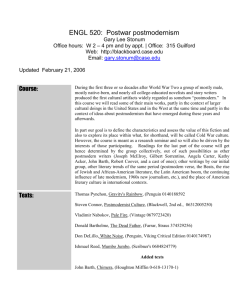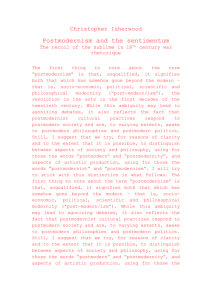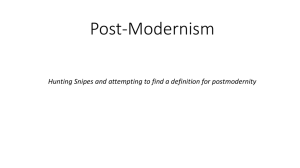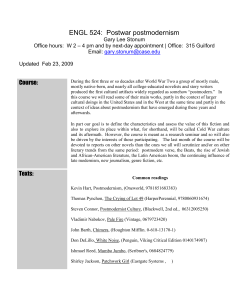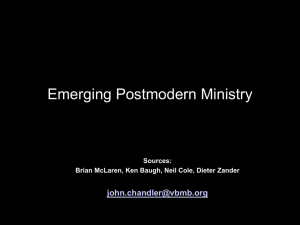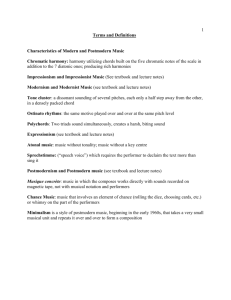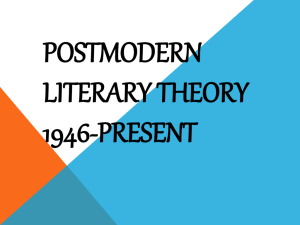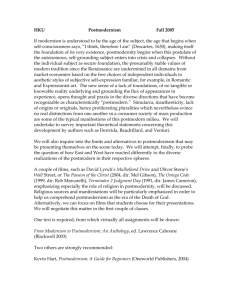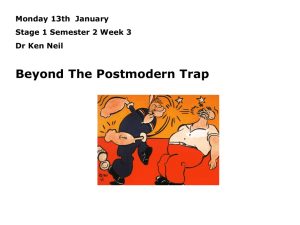Postmodernism
advertisement
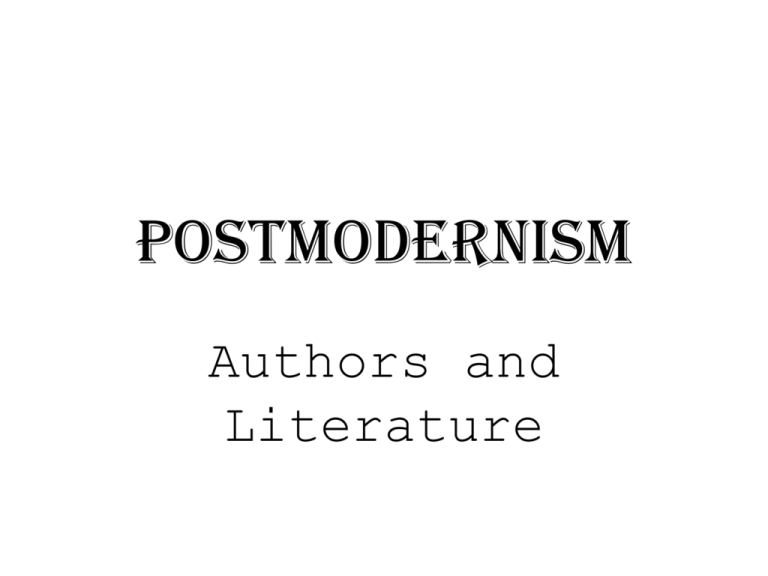
Postmodernism Authors and Literature What is Postmodernism? • Postmodernism is a term that encompasses a wide-range of developments in philosophy, film, architecture, art, literature, and culture. • Originally a reaction to modernism, referring to the lack of artistic, intellectual, or cultural thought or organized principle. • Started around 1940s, exact date is unknown. • Peaked around the 1960s and 1970s with the release of Catch 22 and Slaughterhouse Five Postmodern Literature • What is it? - Used to describe the different aspects of post WW2 literature (modernist literature). - There is not a clear and defined definition of postmodernism because of the little agreement of the concepts and characteristics and ideas within postmodernism. Postmodernist Literature • Postmodernist Literature contains a broad range of concepts and ideas that include: - responses to modernism and its ideas - responses to technological advances - greater diversity of cultures that leads to cultural pluralism. (small groups within a larger society maintain their culture identity). - reconceptualizations of society and history Postmodern Literature • There are a few similarities to modernist literature. - Like modernist literature, both are usually told from an objective or omniscient point of view. - Both literatures explore the external reality to examine the inner states of consciousness of the characters - Both employ fragmentation in narrative and character construction Postmodern Literature: Common Themes • Irony, playfulness, black humor - Example: The Crying Lot of 49, Pynchon uses childish wordplay while discussing serious subjects. An example of his wordplay can be found in the names of his characters: Mike Fallopian, Stanley Koteks, Mucho Maas, and Dr. Hilarius. Postmodern Literature: Common Themes • Patiche - Authors often combine multiple elements in the postmodern genre. Example: Pynchon includes elements from science fiction, pop culture references, and detective fiction to create fictional cultures and concepts. Postmodern Literature: Common Themes • Metafiction - Writing about writing, often used to undermine the authority of the author and to advance stories in unique ways. Example: In Italo Calvino’s novel, If On a Winter’s Night a Traveler, is about a reader attempting to read a novel of the same name. In Kurt Vonnegut’s novel, Slaughterhouse Five, the first chapter is about the writing process of the novel. Postmodern Literature: Common Themes • Paranoia -The belief that there is something out of the ordinary, while everything remains the same. Example: In Kurt Vonnegut’s novel, Breakfast of Champions, a character becomes violent when he imagines everyone else as a robot and he is the only human. Postmodern Literature: Influential works • • • • • • • Catch 22 – Joseph Heller Slaughterhouse Five – Kurt Vonnegut Lost in the Funhouse – John Barth The Things They Carried – Tim O’Brien White Noise – Don DeLillo Gravity’s Rainbow – Thomas Pynchon The Crying of Lot 49 – Thomas Pynchon Postmodern Authors • Joseph Heller - - - Born May 1, 1923 in Brooklyn, New York Known for his post World War satires and playwrights Catch 22 most well-known of his works Other works include: Something Happened, Good as Gold, and Closing Time. Also wrote plays: We Bombed in New Haven, Catch 22, Clevinger’s Trail Postmodern Authors • Thomas Pynchon - - Born May 8, 1937 in Glen Cove, New York. Known for his fictional writing over many different subjects that include: science, mathematics, and history Known for his early works: V, The Crying of Lot 49, and Gravity’s Rainbow. Also wrote essays concerning diverse topics such as missile security and Watts Riots ( a large scale riot that lasted six days in the Watt’s neighborhood of LA). Postmodern Authors • Kurt Vonnegut - Born November 11, 1922 in Indianapolis, Indiana - Known for using Patiche in his works. Blends satire, black comedy, and science fiction to create novels, such as Slaughterhouse Five and Breakfast of Champions. - As a former soldier and prisoner of war, many of his experiences influenced his later works. Postmodern Authors • Tim O’Brien - Born October 1, 1946 in Austin, Minnesota - His career began with the release of If I Die in a Combat Zone, Box Me Up and Ship me. Wrote mainly about his experiences in the Vietnam War - O’Brien uses fiction and reality and blends them into his own genre. He labels his works fiction, however, he uses his situations he experienced in his works. - Most famous work: The Things They Carried References • "Joseph Heller." Wikipedia, The Free Encyclopedia. 19 Mar 2008, 05:42 UTC. Wikimedia Foundation, Inc. 24 Mar 2008 <http://en.wikipedia.org/w/index.php?title=Joseph_Heller&oldid=199280810>. • "Kurt Vonnegut." Wikipedia, The Free Encyclopedia. 21 Mar 2008, 18:26 UTC. Wikimedia Foundation, Inc. 24 Mar 2008 <http://en.wikipedia.org/w/index.php?title=Kurt_Vonnegut&oldid=199877168> • "List of postmodern authors." Wikipedia, The Free Encyclopedia. 10 Mar 2008, 12:37 UTC. Wikimedia Foundation, Inc. 24 Mar 2008 <http://en.wikipedia.org/w/index.php?title=List_of_postmodern_authors&oldid=19721 5707>. "Postmodern literature." Wikipedia, The Free Encyclopedia. 21 Mar 2008, 16:46 UTC. Wikimedia Foundation, Inc. 24 Mar 2008 <http://en.wikipedia.org/w/index.php?title=Postmodern_literature&oldid=199856493>. • • "Thomas Pynchon." Wikipedia, The Free Encyclopedia. 15 Mar 2008, 14:23 UTC. Wikimedia Foundation, Inc. 24 Mar 2008 <http://en.wikipedia.org/w/index.php?title=Thomas_Pynchon&oldid=198410127>.
